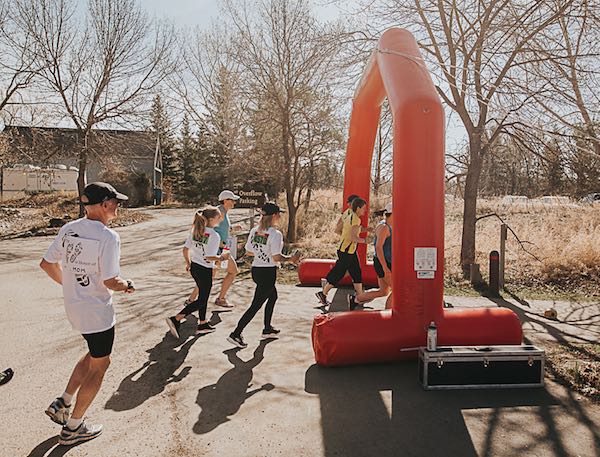Community
Run or Hike for more than your health at the Run/Hike for Hospice on June 5, 2022

With less than one month to go, registration and planning for the 15th Annual Run/Hike for Hospice, presented by RSM Canada, is in fully swing! Choose to hike, walk, or stroll the 1km or 4km within the beautiful Kerry Wood Nature Centre Sanctuary or run 5km along the city’s scenic riverside trails.
“Run/Hike for Hospice is an opportunity to celebrate the journey of life for a loved one or just get outside and spend time with family and friends. The event also raises funds in support of end of life care in Central Alberta,” shared Jerri Taylor, Executive Director of the Red Deer Hospice. “It is a key fundraiser for us, our goal for Run/Hike for Hospice this year is to raise $35,000 in donations and pledges and we are happy to report we are half way there!”
Registration for teams and individuals is open at www.reddeerhospice.com and is just $25 per individual. At the event (and included with your registration) you can expect live music, a burger and plenty of other snacks as well as a t-shirt (while supplies last). Virtual options are available for those who just aren’t ready to be back in a crowd.
IN-PERSON Participants can join us at the outdoor event which will take place at the Kerry Wood Nature Centre Sunday June 5th, 2022. Choose to Hike 1km or 4km within the beautiful Kerry Wood Nature Centre Sanctuary or Run 5km along the city’s scenic riverside trails.
Registration 9:00am
Race Start 10:00am
VIRTUAL Participants are encouraged to complete a Run or Hike in their own time & pace at any destination of their choice while raising funds for Red Deer Hospice.
RACE PACKAGE PICK UP, PLEDGE DROP OFF
Stop by the RSM parking lot (546 Laura Avenue, Red Deer County) just down from the Gasoline Alley Farmer’s Market to pick up your Run Hike for Hospice Race Package or drop off any offline pledges you’ve been collecting!
Friday June 3rd 4:00pm – 7:00pm
Saturday June 4th 10:00am -1:00pm
Register
Register online by purchasing your tickets. Registration fee is $25.
Free for kids ages 12 and under (registration is still required to get a shirt).
For those registering after May 1st, we will have a limited quantity of shirts available on a first come, first served basis.
Help support Red Deer Hospice by collecting pledges & fundraising on our behalf. CanadaHelps.ca makes it easy for you and your team to collect donations virtually. You can even customize your fundraising page and share about your personal connection to Red Deer Hospice. Prizes will be awarded for top fundraisers!
Don’t want to fundraise yourself? Donate to one of our Hikers or Runners that is already registered!
What else can you do to celebrate the life of a loved one & raise awareness around end of life care in Central Alberta?:
- Print off one of our pre-made window hangers to help let your neighbors know you are supporting Red Deer Hospice.
- Have someone you are Running or Hiking in honor of? Feel free to send us a picture along with their name to [email protected] and we will share it with everyone in our public “In Honor Of Album” (found on our Website & Facebook Event).
- Make a connection with us on social media by tagging @RedDeerHospice on FB or @rdhospice on Instagram & using the #hikeforhospicerd2022 or #runforhospicerd2022
For more information, contact our Event Coordinator at 403-309-4344 ext 109 or by email.
Community
Support local healthcare while winning amazing prizes!

|
|
|
|
|
|
|
Community
SPARC Caring Adult Nominations now open!

Check out this powerful video, “Be a Mr. Jensen,” shared by Andy Jacks. It highlights the impact of seeing youth as solutions, not problems. Mr. Jensen’s patience and focus on strengths gave this child hope and success.
👉 Be a Mr. Jensen: https://buff.ly/8Z9dOxf
Do you know a Mr. Jensen? Nominate a caring adult in your child’s life who embodies the spirit of Mr. Jensen. Whether it’s a coach, teacher, mentor, or someone special, share how they contribute to youth development. 👉 Nominate Here: https://buff.ly/tJsuJej
Nominate someone who makes a positive impact in the live s of children and youth. Every child has a gift – let’s celebrate the caring adults who help them shine! SPARC Red Deer will recognize the first 50 nominees. 💖🎉 #CaringAdults #BeAMrJensen #SeePotentialNotProblems #SPARCRedDeer
s of children and youth. Every child has a gift – let’s celebrate the caring adults who help them shine! SPARC Red Deer will recognize the first 50 nominees. 💖🎉 #CaringAdults #BeAMrJensen #SeePotentialNotProblems #SPARCRedDeer
-

 COVID-191 day ago
COVID-191 day agoOntario man launches new challenge against province’s latest attempt to ban free expression on roadside billboards
-

 Energy2 days ago
Energy2 days agoThis Canada Day, Celebrate Energy Renewal
-

 COVID-1911 hours ago
COVID-1911 hours agoNew Peer-Reviewed Study Affirms COVID Vaccines Reduce Fertility
-

 Business7 hours ago
Business7 hours agoOttawa Funded the China Ferry Deal—Then Pretended to Oppose It
-

 Alberta1 day ago
Alberta1 day agoAlberta Next Takes A Look At Alberta Provincial Police Force
-

 Alberta1 day ago
Alberta1 day agoCanadian Oil Sands Production Expected to Reach All-time Highs this Year Despite Lower Oil Prices
-

 International1 day ago
International1 day agoPresident Xi Skips Key Summit, Adding Fuel to Ebbing Power Theories
-

 Alberta10 hours ago
Alberta10 hours agoThe permanent CO2 storage site at the end of the Alberta Carbon Trunk Line is just getting started









